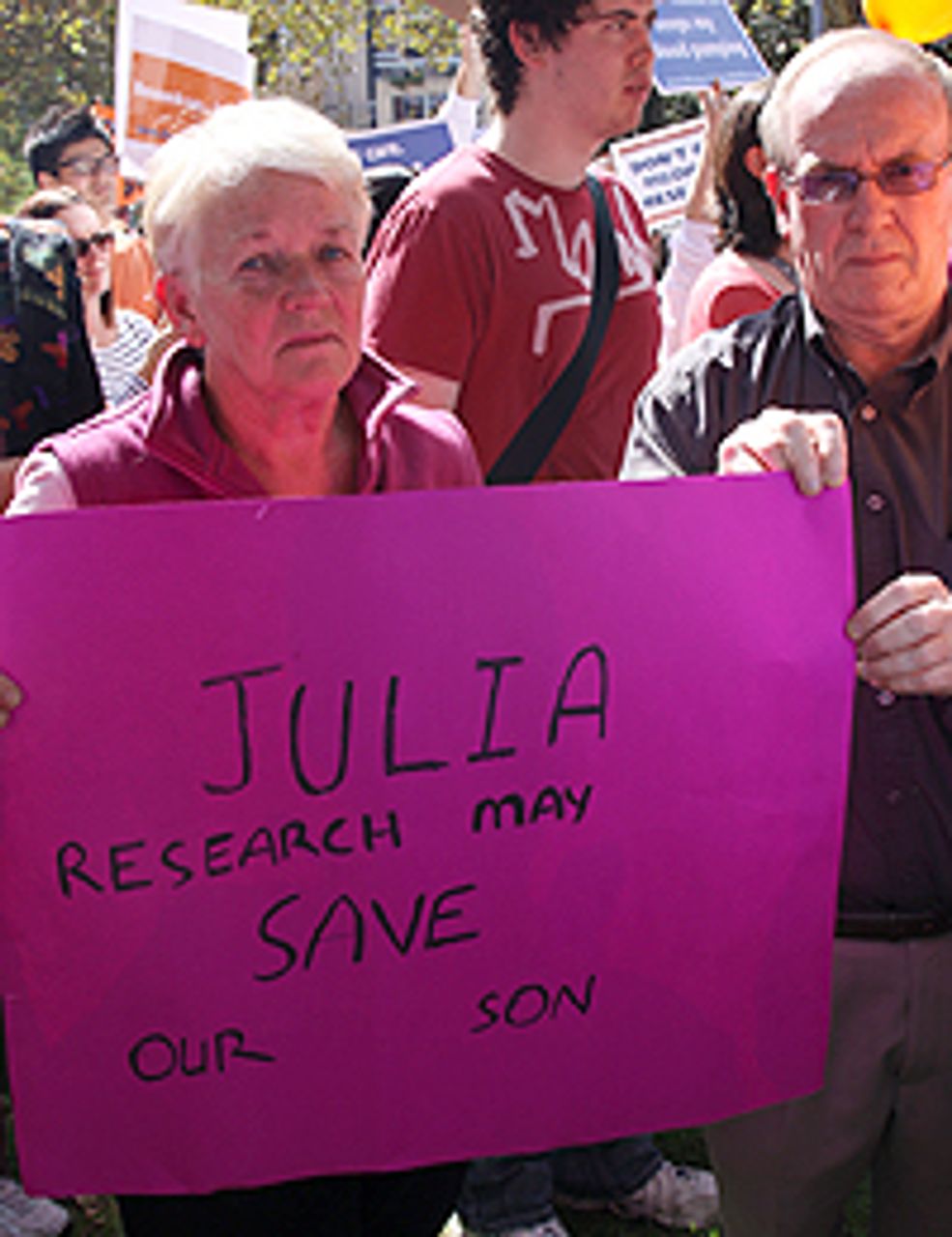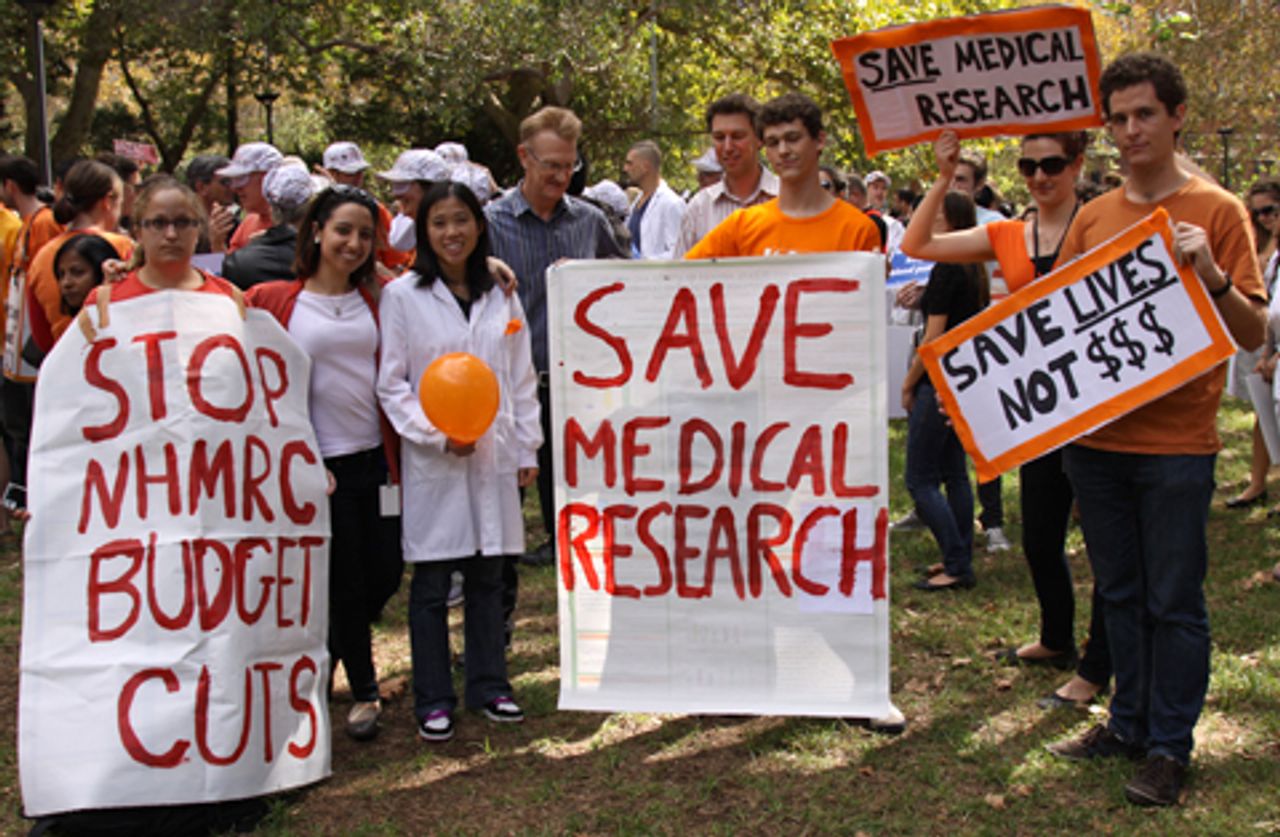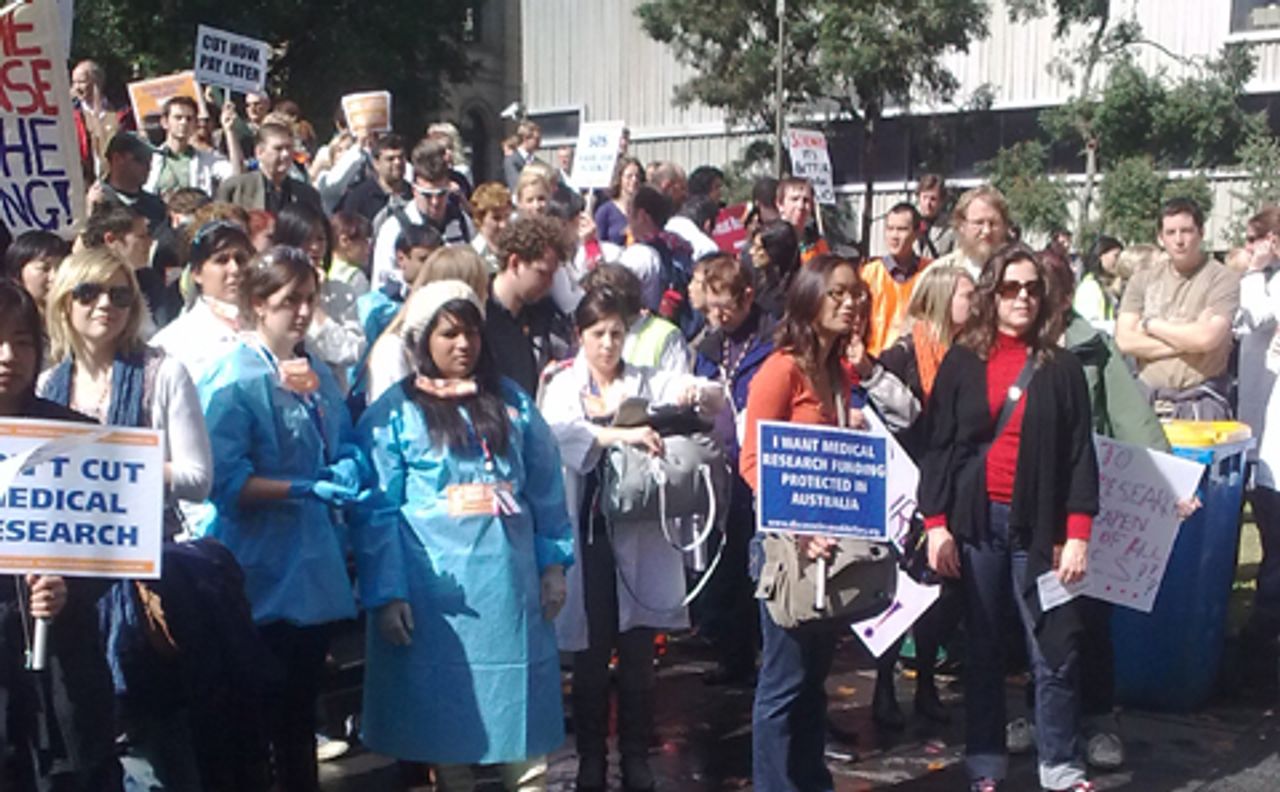Demonstrations yesterday against foreshadowed cuts to medical research in next month’s federal budget attracted thousands of scientists, researchers and their supporters in several Australian cities. The rallies were organised and advertised through the “discoveries need dollars” website, established by a group of medical researchers.
In Sydney, close to 1,000 people came out against the cuts, while in Melbourne about 4,000 attended. Thousands more demonstrated in Canberra and a protest was also staged in Adelaide. Further rallies will be held this week in Perth and Darwin.
 Before yesterday’s events, many researchers from universities and private research institutes closed their laboratories to attend the protests. Also participating were former patients, who had benefited from advanced medical treatment and wished to show their solidarity with the researchers, along with others, who feared that spending cuts would threaten the potential discovery of cures for terminal or incapacitating illnesses suffered by family members and friends.
Before yesterday’s events, many researchers from universities and private research institutes closed their laboratories to attend the protests. Also participating were former patients, who had benefited from advanced medical treatment and wished to show their solidarity with the researchers, along with others, who feared that spending cuts would threaten the potential discovery of cures for terminal or incapacitating illnesses suffered by family members and friends.
Representatives of medical research organisations are demanding that Prime Minister Julia Gillard rule out rumoured cuts to the National Health and Medical Research Council (NHMRC), equivalent to 19 percent of its total funding over the next three years.
Such a funding reduction would have disastrous implications. Executive director of the Victor Chang Cardiac Research Institute, Bob Graham, told the Sydney rally that 1,500 researchers’ jobs would be lost. Moreover, half of all NHMRC funds have been committed to grants research projects that have already begun, meaning that the decline in newly funded projects would be significantly greater than the percentage funding cut.
The quality of medical research in Australia would be dramatically affected. Interrupting funding for a project can mean disrupting extended testing procedures that have gone through a series of non-human trials before being trialled on humans. Most teams that lose funding will be forced to split up into other research projects, or into different fields, losing expertise built up over years, if not decades, of collaboration.
 A section of the Sydney demonstration
A section of the Sydney demonstrationMedical researchers already confront a crisis situation. According to some estimates, 70 percent of grant applications to the NHMRC are considered fundable, but only 23 percent are provided with financial support.
World Socialist Web Site reporters spoke with scientists and researchers in Sydney and Melbourne, who spoke in detail of the destructive impact of the Labor government’s threatened cuts. (See: “Medical workers and students speak against pending spending cuts”)
They were clearly angered by Labor’s budget plans. The most important issue remains, however, the elaboration of a viable political perspective to fight against the proposed attacks.
The various speakers from the platforms urged that pressure be place on the Labor government to change course. They attempted to separate the proposed cuts to medical research from the wider offensive being prepared against the working class, which is being carried out by Labor in order to satisfy demands from big business and the financial markets for a budget surplus. Nor was Gillard’s contemptuous attitude towards medical researchers related to the government’s restructuring of the health and hospital system, which is primarily aimed at slashing public funding for healthcare.
In Sydney, Professor John Shine—a world renowned biochemist and executive director of the Garvan Institute for Medical Research—told the protest rally: “At a time when the government is trying—and I truly believe that this government is genuinely trying to reform the healthcare system—to address the challenges of an ageing population and the increasing costs of healthcare, why do you talk about cutting the really essential crucial element that will deliver the solutions to the problem?”
There is in fact no contradiction between Labor’s healthcare “reforms” and its approach to medical research: both are oriented towards gutting public funding and promoting privately-run, profit-based services and institutions.
 Melbourne protest
Melbourne protestSome speakers demanded the government make other spending cuts while exempting medical research. Bettina Arndt, a sex therapist and clinical psychologist, echoed the demagogic Liberal-National opposition campaigns against government “waste” and overspending. She asked protestors to “just think about the amount of medical research we could have had if the government hadn’t wasted all that money on all those dreadful school halls.”
The keynote speaker in Melbourne was Greens MP Adam Bandt. Posturing as an opponent of the cuts to medical spending, Bandt declared that he had written “to the treasurer [Wayne Swan], seeking an assurance that health and medical funding will not be cut in this budget.” Bandt attempted to downplay fears that the Gillard government would proceed with the foreshadowed cuts, adding that if it did so, the Greens would “work from the floor of parliament to do everything we can to improve the budget and to ensure as far as we can that there will be no cuts to health and medical research.”
This pledge was completely bogus. Bandt and his Greens colleagues in parliament have already committed to passing Labor’s budget, irrespective of its contents, and will therefore be entirely responsible for whatever medical research cuts are made.
In reality, medical researchers and the wider public opposed to the threatened funding withdrawals are locked in a political struggle against the Greens-backed Labor government.
Like her counterparts internationally, Gillard is preparing an austerity program aimed at slashing public spending on vital areas of public spending, including health, education, social infrastructure, and welfare, while at the same cutting taxes for corporations. The only way to defend public healthcare and medical research is to develop an independent political movement against the Labor government, uniting all professional workers in the field with every other section of the working class confronting similar attacks on their working conditions and living standards.
The proposed medical research cuts underscore the incompatibility of the profit system with the rational development of medical science. Researchers and scientists spend decades developing their expertise and new areas of investigation, which often have the potential to deliver medical breakthroughs that benefit the entire world’s population. Yet at every step, this potential is hindered by chronic funding shortfalls, demands within universities for proposed research projects to satisfy arbitrary “cost-benefit” and productivity tests, and the destructive impact of the major drug and bio-medicine corporations, which seek to monopolise knowledge, and even patent DNA and other physical materials, in order to boost profits.
High quality healthcare, including access to the most advanced scientific discoveries, ought to be a social right. But under the current two-tier system it is available only to those who can afford to pay. Tens of billions of dollars are needed to upgrade hospitals, expand medical research, and provide free, high quality health care to all who need it.
This is only possible through the development of an internationalist and socialist movement of the working class, fighting for the rational reorganisation of economic life. That is the program fought for by the Socialist Equality Party.
